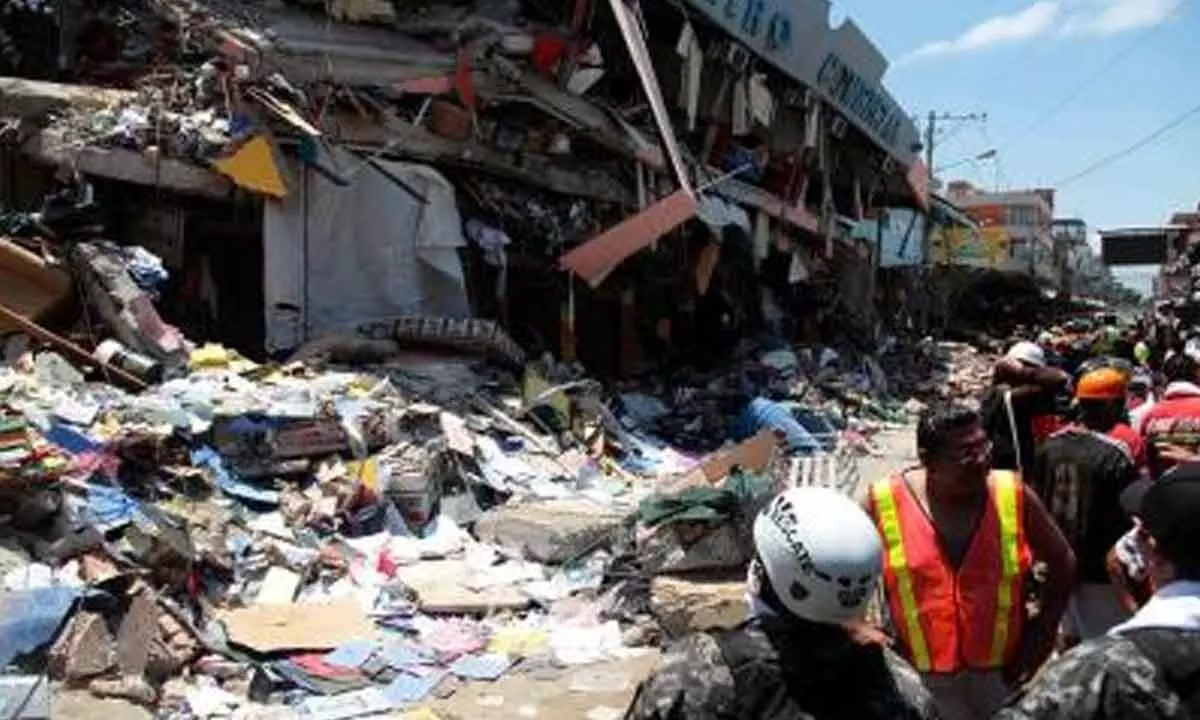Live
- 18 companies recruit 979 SRKR students
- Celebration of India’s cultural heritage: PM on Maha Kumbh
- Ramraj opens new showroom at Poranki
- Road repairs, infrastructure priority: Minister
- Swarna Andhra@2047
- CM Revanth pitches for Railway Coach Factory at Kazipet
- ICU Ward opened at district hospital
- Pushpa Actor’S Action-Packed Day: Lights, camera, arrest
- National Lok Adalat today
- Teacher Manga Rani selected for national workshop
Just In
Ecuador rocked by gang-related violence as law enforcement officers taken hostage in prisons

The fragile security situation in Ecuador was underscored by a series of car bombings and the hostage-taking of more than 50 law enforcement officers inside various prisons, just weeks after the country was shaken by the assassination of a presidential candidate.
Quito : The fragile security situation in Ecuador was underscored by a series of car bombings and the hostage-taking of more than 50 law enforcement officers inside various prisons, just weeks after the country was shaken by the assassination of a presidential candidate.
Authorities said the brazen actions were the response of criminal groups to the relocation of various inmates and other measures taken by the country's corrections system. The crimes happened three weeks after the slaying of presidential candidate Fernando Villavicencio, Associated Press reported.
Ecuador's National Police reported no injuries resulting from the four explosions in Quito, the capital, and in a province that borders Peru, while Interior Minister Juan Zapata said none of the law enforcement officers taken hostage in six different prisons had been injured.
The corrections system, known as the National Service for Attention to Persons Deprived of Liberty, in recent years lost control of large prisons, which have been the site of violent riots resulting in dozens of deaths. It has taken to transferring inmates to manage gang-related disputes.
In Quito, the first bomb went off Wednesday night in an area where an office of the country's corrections system was previously located. The second explosion in the capital happened early Thursday outside the agency's current location, Associated Press reported.
Ecuador National Police General Pablo Ramírez, the national director of anti-drug investigations, told reporters on Thursday that police found gas cylinders, fuel, fuses and blocks of dynamite among the debris of the crime scenes in Quito, where the first vehicle to explode was a small car and the second was a pickup truck.
Authorities said gas tanks were used in the explosions in the El Oro communities of Casacay and Bella India.
The fire department in the city of Cuenca, where one of the prisons in which law enforcement officers are being held hostage is located, reported that an explosive device went off Thursday night. The department did not provide additional details beyond saying the explosion damaged a car.
Zapata said seven of prison hostages are police officers and the rest are prison guards. In a video shared on social media, which Zapata identified as authentic, a police officer who identifies himself as Lt. Alonso Quintana asks authorities "not to make decisions that violate the rights of persons deprived of their liberty". He can be seen surrounded by a group of police and corrections officers and says that about 30 people are being held by the inmates.
Ecuadorian authorities attribute the country's spike in violence over the past three years to a power vacuum triggered by the killing in 2020 of Jorge Zambrano, alias "Rasquina" or "JL," the leader of the local Los Choneros gang. Members carry out contract killings, run extortion operations, move and sell drugs, and rule prisons.
Los Choneros and similar groups linked to Mexican and Colombian cartels are fighting over drug-trafficking routes and control of territory, including within detention facilities, where at least 400 inmates have died since 2021, Associated Press reported.
Villavicencio, the presidential candidate, had a famously tough stance on organised crime and corruption. He was killed on August 9 at the end of a political rally in Quito despite having a security detail that included police and bodyguards.
He had accused Los Choneros and its imprisoned current leader Adolfo Macías, alias "Fito," whom he linked to Mexico's Sinaloa cartel, of threatening him and his campaign team days before the assassination.
Ecuador's Security Secretary, Wagner Bravo, told FMundo radio station that six prisoners who were relocated may have been involved in Villavicencio's slaying.
The Mayor of Quito, Pabel Munoz, told the Teleamazonas television station that he was hoping "for justice to act quickly, honestly and forcefully".
"We are not going to give up. May peace, calm and security prevail among the citizens," Munoz said.
The country's National Police tallied 3,568 violent deaths in the first six months of this year, far more than the 2,042 reported during the same period in 2022. That year ended with 4,600 violent deaths, the country's highest in history and double the total in 2021.
The port city of Guayaquil has been the epicentre of violence, but Esmeraldas, a Pacific coastal city, is also considered one of the country's most dangerous. There, six government vehicles were set on fire earlier this week, according to authorities.

© 2024 Hyderabad Media House Limited/The Hans India. All rights reserved. Powered by hocalwire.com






